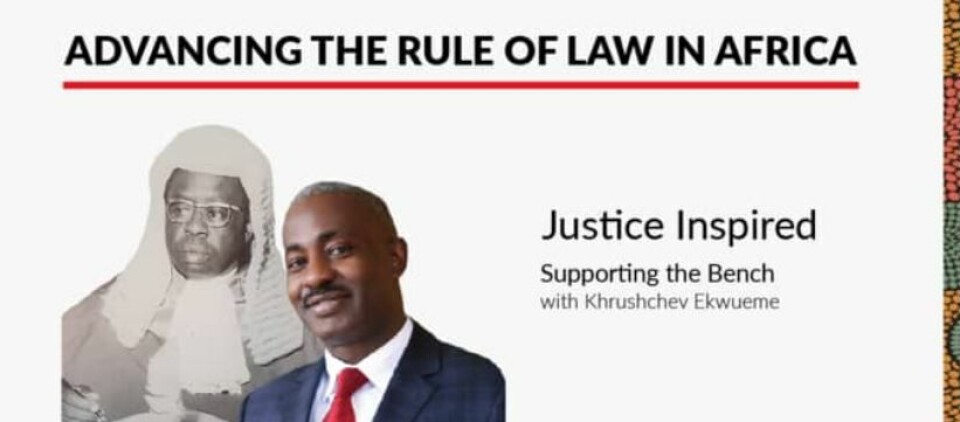Copyright : Re-publication of this article is authorised only in the following circumstances; the writer and Africa Legal are both recognised as the author and the website address www.africa-legal.com and original article link are back linked. Re-publication without both must be preauthorised by contacting editor@africa-legal.com
Justice Inspired: Supporting the Bench

In the fourth of a six-part series showcasing champions of the rule of law in Africa, Khrushchev Ekwueme of Olaniwun Ajayi LP talks to Craig Sisterson about lawyers’ roles in supporting the court system.
The courts' independence, performance and administration are vital to upholding the rule of law, and the African Bar should do as much as possible to support the Bench, said international law and dispute resolution expert Khrushchev Ekwueme.
“More often than not people place a premium on the administration of justice without paying attention to the administration of the courts,” said Ekwueme, a partner at leading Nigerian law firm Olaniwun Ajayi LP. “I have, however, found in my work that if the courts are not properly administered, then the judges will not be in a position to render justice.”
When he was assisting with the programme of events for the Law Week of the Lagos Bar in 2018, Ekwueme and his Law Week committee introduced what he called “a dialogue between the Bench and the Bar”, bringing together highly respected judges and top legal practitioners to discuss administration issues hampering the administration of courts and justice in Nigeria.
The platform has continued in subsequent Law Weeks of the Lagos Bar, providing an opportunity for dialogue aimed at exposing human rights abuses, facilitating timely and just dispensation of justice as well as efficient administration of the courts in Nigeria.
Ekwueme, whose own journey as a strong voice for the rule of law was inspired many years ago by Nelson Mandela and Justice Anthony Aniagolu of the Nigerian Supreme Court, also facilitates knowledge development sessions for Nigerian judges as a means of supporting and contributing to the development of the administration of justice in Nigeria.
“Some of these sessions focused on the administration of justice, and I would talk about three main things,” explained Ekwueme. “First, the importance of the substantive correctness of the decisions of courts, because if a decision is wrong, it usually results in a miscarriage of justice. Second, the importance of consistency in the decisions of the courts in order to achieve certainty and predictability of the law, and third the importance of quick dispensation of justice because justice delayed is justice denied.”
The late Justice Aniagolu, who became Anambra State’s first Chief Justice in 1976 and then served on the Supreme Court of Nigeria, hailed from a neighbouring village to where Ekwueme grew up in Nigeria. “He emphasised the importance of the rule of law in building a just society,” Ekwueme recalled. “According to him, a judge and the Bench represent Almighty God, and should thus strive to foster justice for the parties before them. That, for me, is a very powerful message to judges in the discharge of their judicial functions.”
Human rights can be challenging in Africa generally, even in nations where there are democratic governments, notwithstanding the various domestic and international instruments available to most African countries to protect human rights, said Ekwueme.
“Some politicians want to preserve themselves in power or create opportunities for their cronies or members of their families. They use and abuse the law against their opponents,” Ekwueme commented. It’s thus vital that the legal profession strives to be a strong voice for the rule of law.
While being ready to challenge those in power for human rights abuses, and instituting actions in court where necessary, the Bar should support the Bench as much as possible regarding timely and just dispensation of justice, educate younger lawyers on the importance of the rule of law, and ensure its own rules on professional ethics are observed, emphasised Ekwueme. “Some of the problems we are seeing with the administration of justice in Africa include lawyers using dilatory techniques to abuse court processes. The Bar should thus punish lawyers who try to institute frivolous actions or use techniques that would delay cases or abuse court processes.”
To join Africa Legal's mailing list please click here
